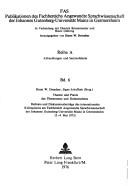
ISBN: 3261017929 Year: 1975 Publisher: Bern Lang
Abstract | Keywords | Export | Availability | Bookmark
 Loading...
Loading...Choose an application
- Reference Manager
- EndNote
- RefWorks (Direct export to RefWorks)
Sociolinguistics --- Lingua francas --- Pidgin languages --- Creole dialects --- Creole languages --- Creolized languages --- Languages, Mixed --- Contact vernaculars --- Hybrid languages --- Jargons --- Pidgeon languages --- Pigeon languages --- Linguae francae --- Trade languages --- Vehicular languages --- Languages in contact --- Creole dialects. --- Lingua francas. --- Pidgin languages.
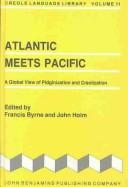
ISBN: 9027252327 9786613328144 1283328143 9027277419 9789027277411 9781283328142 6613328146 9789027252326 1556191650 9781556191657 Year: 1993 Publisher: Amsterdam ; Philadelphia : J. Benjamins,
Abstract | Keywords | Export | Availability | Bookmark
 Loading...
Loading...Choose an application
- Reference Manager
- EndNote
- RefWorks (Direct export to RefWorks)
Selected papers from the Society for Pidgin and Creole linguistics.
Creolan languages --- Pidgin --- Sociolinguistics --- Creole dialects --- Languages in contact --- Pidgin languages --- Contact vernaculars --- Hybrid languages --- Jargons --- Pidgeon languages --- Pigeon languages --- Lingua francas --- Languages, Mixed --- Areal linguistics --- Creole languages --- Creolized languages --- Creole dialects. --- Languages in contact. --- Pidgin languages.
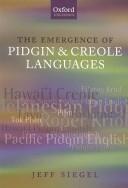
ISBN: 9780199216673 0199216673 9780199216666 0199216665 9780191527135 0191527130 1281341525 9781281341525 9786611341527 1435653181 1383035520 Year: 2008 Publisher: Oxford ; New York : Oxford University Press,
Abstract | Keywords | Export | Availability | Bookmark
 Loading...
Loading...Choose an application
- Reference Manager
- EndNote
- RefWorks (Direct export to RefWorks)
This work examines the emergence of pidgins and creoles and the controversies surrounding current theories about them. Among the questions considered are why their grammars are simple at the pidgin-creole-postcreole life cycle, and the causes of grammatical innovation. The analysis is supported with examples and case studies.
Pidgin languages --- Creole dialects --- History --- Creolan languages --- Pidgin --- Dialectology --- Creole languages --- Creolized languages --- Languages, Mixed --- Contact vernaculars --- Hybrid languages --- Jargons --- Pidgeon languages --- Pigeon languages --- Lingua francas --- History. --- Pidgin languages - History --- Creole dialects - History
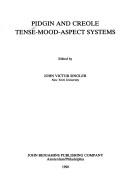
ISBN: 9027252262 1556191022 9786613328274 1283328275 9027278261 Year: 1990 Publisher: Amsterdam ; Philadelphia : J. Benjamins,
Abstract | Keywords | Export | Availability | Bookmark
 Loading...
Loading...Choose an application
- Reference Manager
- EndNote
- RefWorks (Direct export to RefWorks)
More than any other area of the grammar, tense-mood-aspect (TMA) has provided evidence to fuel the ongoing debates about creole genesis and about the relevance of pidgin and creole phenomena to language theory more generally. This volume advances the debate in two ways. First, it makes available in print for the first time and in its original form William Labov's On the Adequacy of Natural Languages: I. "The Development of Tense". Second, the volume features detailed analyses of the TMA systems of seven diverse pidgins and creoles, which vary in terms of their lexifying (superstrate) languages, their location, and their social histories. With the authors employing a broad range of theoretical perspectives for their analyses, the study demonstrates both the extent to which pidgins and creoles share a single, prototypical TMA system and the degree to which individual pidgins and creoles diverge from that prototype. This is a volume that brings forward our knowledge and understanding of pidgin and creole TMA. The seven languages analyzed are: Capeverdean Crioulo, Kituba, Papiamentu, Berbice Dutch, Haitian Creole, Kru Pidgin English, and Eighteenth Century Nigerian Pidgin English.
Creolan languages --- Pidgin --- Grammar --- Creole dialects --- -Pidgin languages --- -Contact vernaculars --- Hybrid languages --- Jargons --- Pidgeon languages --- Pigeon languages --- Lingua francas --- Languages, Mixed --- Creole languages --- Creolized languages --- Pidgin languages --- Verb --- Contact vernaculars --- Verb. --- Langues créoles --- Pidgin (langues) --- Pidgin-English (langue)
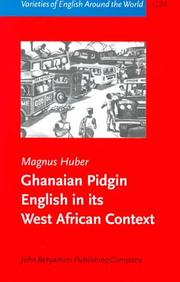
ISSN: 01727362 ISBN: 1283548968 9786613861412 9027272964 9789027272966 1556197225 9027248826 9781556197222 9789027248824 Year: 1999 Volume: v. 24 Publisher: Amsterdam ; Philadelphia : J. Benjamins,
Abstract | Keywords | Export | Availability | Bookmark
 Loading...
Loading...Choose an application
- Reference Manager
- EndNote
- RefWorks (Direct export to RefWorks)
This first published full-scale study of the Ghanaian variety of West African Pidgin English (GhaPE) makes extensive use of hitherto neglected historical material and provides a synchronic account of GhaPE's structure and sociolinguistics. Special focus is on the differences between GhaPE and other West African Pidgins, in particular the development of, and interrelations between, the different varieties of restructured English in West Africa, from Sierra Leone to Cameroon. This monograph further includes an overview of the history of Afro-European contact languages in Lower Guinea with special emphasis on the Gold Coast; an outline of the settlement of Freetown, Sierra Leone, with a description of how and when the transplantation of Sierra Leonean Krio to other West African countries took place; an analysis of the linguistic evidence for the origin, development, and spread of restructured Englishes on the Lower Guinea Coast; an account of the different varieties of GhaPE and their sociolinguistic status in the contemporary linguistic ecology of Ghana; as well as a comprehensive structural description of the "uneducated" variety of GhaPE.
Pidgin English --- Pidgin languages --- History. --- Contact vernaculars --- Hybrid languages --- Jargons --- Pidgeon languages --- Pigeon languages --- Pidgeon English --- Pigeon English --- Lingua francas --- Languages, Mixed --- English language --- Dialects --- History --- E-books --- Pidgin --- Dialectology --- Ghana
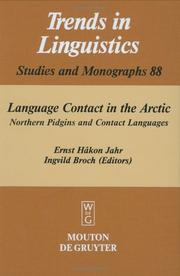
ISBN: 3110143356 3110813300 9783110143355 Year: 1996 Volume: 88 Publisher: Berlin: de Gruyter,
Abstract | Keywords | Export | Availability | Bookmark
 Loading...
Loading...Choose an application
- Reference Manager
- EndNote
- RefWorks (Direct export to RefWorks)
No detailed description available for "Language Contact in the Arctic".
Pidgin languages --- Languages in contact --- Congresses. --- Pidgin --- Dialectology --- Arctica --- Langues en contact --- Pidgins (Langues) --- Congresses --- Congrès --- Areal linguistics --- Contact vernaculars --- Hybrid languages --- Jargons --- Pidgeon languages --- Pigeon languages --- Lingua francas --- Languages, Mixed
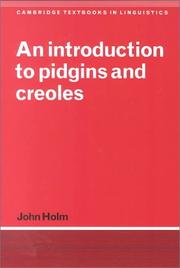
ISBN: 0521584604 0521585813 1107114055 0511642776 1282388975 9786612388972 0511153066 051155589X 1139164155 0511054122 9780521585811 9780521584609 0511039859 9780511039850 9780511153068 9780511054129 9781139164153 9781282388970 9781107114050 6612388978 9780511642777 Year: 2000 Publisher: Cambridge [England] ; New York : Cambridge University Press,
Abstract | Keywords | Export | Availability | Bookmark
 Loading...
Loading...Choose an application
- Reference Manager
- EndNote
- RefWorks (Direct export to RefWorks)
This textbook is a clear and concise introduction to the study of how new languages come into being. Starting with an overview of the field's basic concepts, it surveys the new languages that developed as a result of the European expansion to the Americas, Africa, Asia and the Pacific. Long misunderstood as 'bad' versions of European languages, today such varieties as Jamaican Creole English, Haitian Creole French and New Guinea Pidgin are recognized as distinct languages in their own right. John Holm examines the structure of these pidgins and creoles, the social history of their speakers, and the theories put forward to explain how their vocabularies, sound systems and grammars evolved. His new findings on structural typology, including non-Atlantic creoles, permit a wide-ranging assessment of the nature of restructured languages worldwide. This much-needed book will be welcomed by students and researchers in linguistics, sociolinguistics, western European languages, anthropology and sociology.
Arts and Humanities --- Language & Linguistics --- Creolan languages --- Pidgin --- Creole dialects --- Pidgin languages --- 800.88 --- 800.88 Mengtalen --- Mengtalen --- Contact vernaculars --- Hybrid languages --- Jargons --- Pidgeon languages --- Pigeon languages --- Lingua francas --- Languages, Mixed --- Creole languages --- Creolized languages --- Creole dialects. --- Pidgin languages.
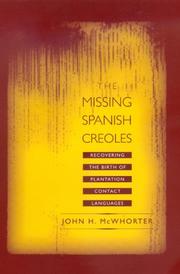
ISBN: 0520923499 1597347566 9780520923492 0585391661 9780585391663 0520219996 9780520219991 9781597347563 Year: 2000 Publisher: Berkeley : University of California Press,
Abstract | Keywords | Export | Availability | Bookmark
 Loading...
Loading...Choose an application
- Reference Manager
- EndNote
- RefWorks (Direct export to RefWorks)
John McWhorter challenges an enduring paradigm among linguists in this provocative exploration of the origins of plantation creoles. Using a wealth of data--linguistic, sociolinguistic, historical--he proposes that the ""limited access model"" of creole genesis is seriously flawed.
Creole dialects --- Pidgin languages --- Blacks --- Negroes --- Ethnology --- Contact vernaculars --- Hybrid languages --- Jargons --- Pidgeon languages --- Pigeon languages --- Lingua francas --- Languages, Mixed --- Creole languages --- Creolized languages --- History. --- Languages. --- Black persons --- Black people --- Languages --- History
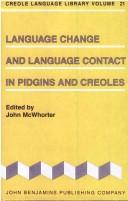
ISBN: 1282163620 9786612163623 902729948X 9789027299482 1556196687 9027252432 Year: 2000 Publisher: Amsterdam ; Philadelphia : J. Benjamins,
Abstract | Keywords | Export | Availability | Bookmark
 Loading...
Loading...Choose an application
- Reference Manager
- EndNote
- RefWorks (Direct export to RefWorks)
This book collects a selection of fifteen papers presented at three meetings of the Society for Pidgin and Creole Linguistics in 1996 and 1997. The focus is on papers which approach issues in creole studies with novel perspectives, address understudied pidgin and creole varieties, or compellingly argue for controversial positions.
LANGUAGE ARTS & DISCIPLINES --- Linguistics / General --- Pidgin languages --- Creole dialects --- Languages in contact --- Linguistic change --- Creole languages --- Creolized languages --- Languages, Mixed --- Contact vernaculars --- Hybrid languages --- Jargons --- Pidgeon languages --- Pigeon languages --- Lingua francas --- Historical linguistics --- Language and languages
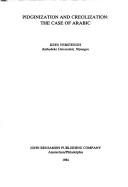
ISBN: 1283314126 9786613314123 9027280126 9789027280121 9027235295 9789027235299 9781283314121 6613314129 Year: 1984 Publisher: Amsterdam : J. Benjamins,
Abstract | Keywords | Export | Availability | Bookmark
 Loading...
Loading...Choose an application
- Reference Manager
- EndNote
- RefWorks (Direct export to RefWorks)
This book is concerned with the notions of "pidginization" and "creolization" and the role of these processes of language learning in the history of the Arabic language. It is argued that when a new type of Arabic emerged after the Islamic conquests in the 7th century AD, the language went through these processes, as can be concluded from the sociolinguistic context of the period. The radical changes in the language that led to the development of the modern dialects are then seen as the result of pidginization and creolization.
Arabic language --- Pidgin languages. --- Creole dialects, Arabic. --- Arabic Creole dialects --- Contact vernaculars --- Hybrid languages --- Jargons --- Pidgeon languages --- Pigeon languages --- Lingua francas --- Languages, Mixed --- History. --- Dialectology --- Creolan languages --- Pidgin --- Arabic languages

 Search
Search Feedback
Feedback About UniCat
About UniCat  Help
Help News
News